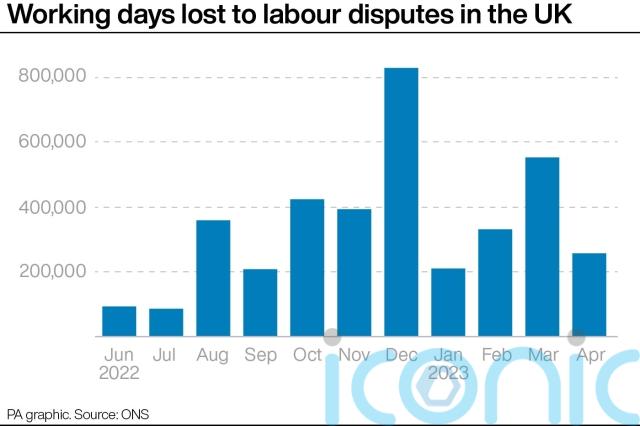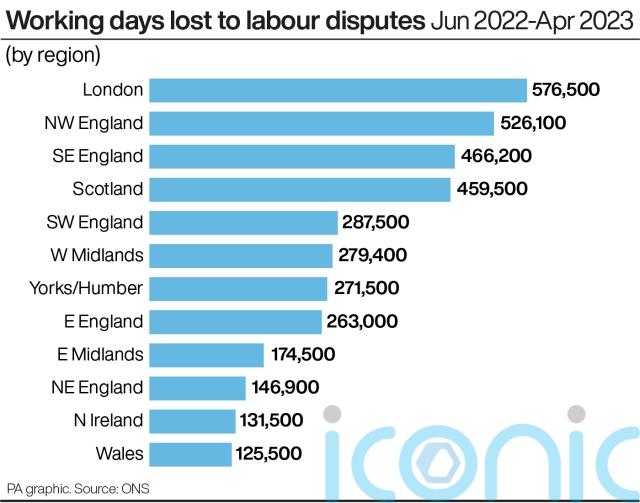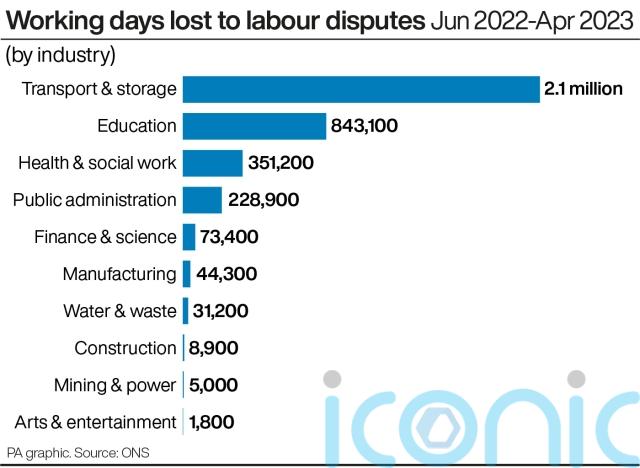
Over the past year the UK has experienced a level of strike action the like of which has not been seen in the country for more than three decades.
Some 3.7 million working days were lost through labour disputes from June 2022 to April 2023, according to latest available data from the Office for National Statistics.
This is the highest for any 11-month period since July 1989 to May 1990, when 4.8 million were lost.
December 2022 saw the most working days lost, at 829,000.

The number reflects the impact of a range of strikes, including disputes involving postal workers, driving examiners, rail workers, Border Force staff, ambulance workers and nurses.
It is the highest total for a single month since November 2011, when 997,000 days were lost.
It is also the second highest total since July 1989, when 2.4 million were lost.
Disputes affecting London and north-west England together accounted for nearly a third (30%) of all working days lost in the 11 months to April this year, according to analysis by the PA news agency.
There were 576,500 days lost in London (16% of the total) and 526,100 (14%) in the North West.
South-east England saw the next highest number, at 466,200 days (13%), followed by Scotland (459,500 or 12%).
Wales recorded the fewest days lost, 125,500, accounting for just 3% of the UK total.

More days have been lost in the private sector (57%, or 2.1 million) than the public sector (43%, or 1.6 million), though the proportions have varied from month to month.
For example, in December 2022 – the month with the highest number of working days lost – 80% were in the private sector, driven mainly by the volume of disputes in the rail and postal industries.
But in March 2023, which saw the second highest total of days lost, 89% were in the public sector, reflecting a wave of strikes involving civil servants, junior doctors and teachers.
March also saw the highest number of workers involved in disputes, at 303,000, while December saw around half that figure, at 155,000.

Of the 3.7 million number of working days lost from June 2022 to April 2023, more than half (57%, or 2.1 million) were in transport, storage and communication industries – a reflection of the frequency of rail strikes, but also of recurring disputes involving Border Force staff and driving instructors.
Nearly a quarter (23%) were to do with education, 10% health and social work and 6% public administration.
Subscribe or register today to discover more from DonegalLive.ie
Buy the e-paper of the Donegal Democrat, Donegal People's Press, Donegal Post and Inish Times here for instant access to Donegal's premier news titles.
Keep up with the latest news from Donegal with our daily newsletter featuring the most important stories of the day delivered to your inbox every evening at 5pm.